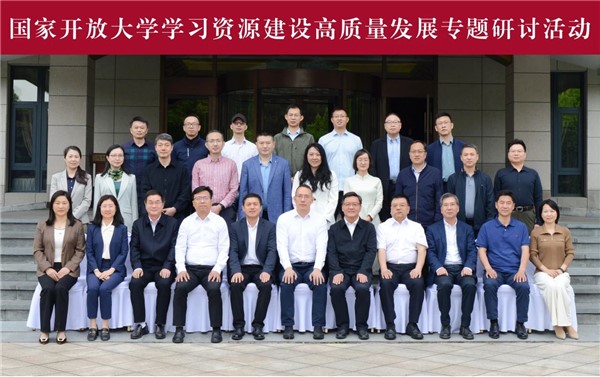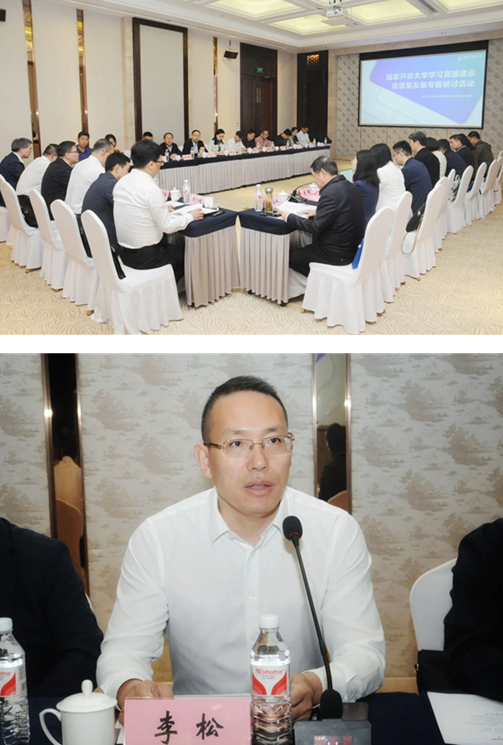 On 25 April 2024, the Open University of China (OUC) hosted a special seminar on the high-quality development of learning resources in Shaoxing City, Zhejiang Province.
On 25 April 2024, the Open University of China (OUC) hosted a special seminar on the high-quality development of learning resources in Shaoxing City, Zhejiang Province.
The seminar was centred around discussions on the evaluation of specialized courses and the progress in creating sample libraries of diverse learning resources. The aim was to promote excellence and improve the quality of learning resource development. Li Song, a member of the Party Committee and vice president of OUC, attended the event. The gathering included about 20 participants, featuring leaders and key personnel responsible for resource development from eight branch open universities in Zhejiang, Jiangxi, Anhui, Henan, Fujian, Harbin, Xi'an, and Wuhan. Additionally, heads of relevant departments from the OUC headquarters’ School of Humanities, School of Science and Engineering, School of Agroforestry and Medicine (Rural Revitalisation College), School of Foreign Languages, and the OUC Ubiquitous Age were present. The event was chaired by Li Wei, director of the OUC Learning Resources Department.

Li Song emphasised that this year not only marks the third year of implementing the national education digitalisation strategy but also represents a period dedicated to "expanding excellence and improving quality" in digital education. The first step in executing this digitalisation is focusing on resources, which are essential and mandatory aspects to address. It is crucial to prioritize the development of open educational resources and to effectively respond to the two significant contemporary challenges: "A Leading Country in Education, the OUC’s Role" and "the Relationship Between Open Education and a Learning Society", using high-quality resources. We must set standards, encourage transformation, and develop top-notch learning resources. Additionally, it is vital to construct platforms, establish mechanisms, and foster the integration and shared use of these resources. Improving both quality and efficiency, concentrating on innovation, and accelerating the complete digitalisation process of learning resources are also necessary steps. To improve and enhance the quality of learning resources, it's essential to establish standards, promote transformation, and create high-quality, exquisite resources. We also need to build platforms and mechanisms to foster the integration and shared use of these resources. Furthermore, focusing on innovation and accelerating the full-process digitization of learning resources is crucial for enhancing both quality and efficiency. Specifically, the following six tasks need to be accomplished:
- Establish a set of standards and sample libraries for open educational resources.
- Develop tools and methods for creating learning resources that meet the needs of adult learners.
- Construct four "first-class" resource hubs around key disciplinary majors.
- Establish a mechanism for the joint contribution and sharing of resources within the open education system.
- Reform and explore using a "point-line-plane" approach, ensuring effective pilot implementation.
- Conduct scientific evaluations and provide feedback on learning resources.
At the event, the key tasks for 2024 concerning learning resources were introduced, including evaluations of specialized courses in Law, Accounting, and Computer Science and Technology. The work plan for a sample library of diverse learning resources was also highlighted. Attendees engaged in thorough exchanges and discussions on topics such as strengthening the evaluation of learning resources, improving the course evaluation index system, experiences in constructing diverse learning resources, and the collaborative construction of a sample library. Constructive opinions and suggestions were offered from several perspectives. These included leveraging the advantages of the open university system for a coordinated national response in learning resources, using artificial intelligence to enhance the construction and application of learning resources, developing distinctive resources tailored for open education and learners' needs, optimizing the metrics of the course evaluation index system, enhancing classification standards and intelligent applications for the learning resource sample library, innovating the learning resource evaluation system, ensuring the security of resource content and enhancing protection of intellectual property rights, and exploring new productive forces in the field of learning resources.
On 26 April, Li Song led a research team to Zhejiang Open University (OU). The team toured several facilities including Lexuegang, a smart learning exhibition and experience centre that utilizes AI, big data, and new media technologies. They also visited the Convergence Media Centre for Smart Education and the Function Zone for Elderly Education at Zhejiang OU. Discussions were held with Zhang Jianguo, secretary of the Party Committee, and Zhang Jixian, a member of the Party Committee and vice president of Zhejiang OU. The discussions covered topics such as the university's operations, achievements, learning resources, and educational practices in recent years. Both parties exchanged views on promoting moral education, tailoring teaching to meet diverse needs, serving specific groups, and contributing to the goal of becoming a leading country in education.

This seminar and the subsequent investigation have further reinforced the consensus on learning resource reform. It is crucial to implement strategies for the high-quality development of learning resources by setting standards and examples. We must also drive changes in the production and management of learning resources through artificial intelligence and future learning technologies. Moving forward, the headquarters' Learning Resources Department will collaborate with OUC branches, colleges, and relevant supporting units to make substantial progress by focusing on reform objectives and to ensure the high-quality development of open educational resources in practice.
By the Learning Resources Department